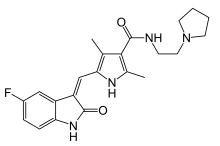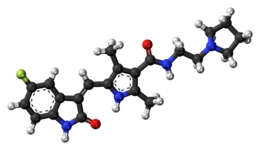Toceranib
 | |
 | |
| Clinical data | |
|---|---|
| Trade names | Palladia |
| AHFS/Drugs.com | International Drug Names |
| Routes of administration | Oral |
| ATCvet code | |
| Legal status | |
| Legal status |
|
| Pharmacokinetic data | |
| Bioavailability | 77% |
| Protein binding | 91%-93% |
| Elimination half-life | 16 h |
| Identifiers | |
| |
| CAS Number | |
| PubChem CID | |
| ChemSpider | |
| UNII | |
| ChEMBL | |
| Chemical and physical data | |
| Formula | C22H25FN4O2 |
| Molar mass |
396.46 g/mol 494.46 g/mol (phosphate) |
| 3D model (JSmol) | |
| |
Toceranib is a receptor tyrosine kinase inhibitor and is used in the treatment[1] of canine mast cell tumor also called mastocytoma. Together with masitinib (Kinavet (US)/Masivet (EU/ROW) by AB Science), toceranib is the only dog-specific anti-cancer drug[2] approved by the U.S. Food and Drug Administration.[3] It is marketed as Palladia as its phosphate salt, toceranib phosphate (INN) by Pfizer. It was developed by SUGEN as SU11654,[4] a sister compound to sunitinib, which was later approved for human therapies. Toceranib is likely to act mostly through inhibition of the kit tyrosine kinase, though it may also have an anti-angiogenic effect.
References
- ↑ London CA, Malpas PB, Wood-Follis SL, et al. (June 2009). "Multi-center, Placebo-controlled, Double-blind, Randomized Study of Oral Toceranib Phosphate (SU11654), a Receptor Tyrosine Kinase Inhibitor, for the Treatment of Dogs with Recurrent (Either Local or Distant) Mast Cell Tumor Following Surgical Excision". Clin Cancer Res. 15 (11): 3856–65. doi:10.1158/1078-0432.CCR-08-1860. PMID 19470739.
- ↑ CBS News FDA Approves First-Ever Dog Cancer Drug
- ↑ FDA NEWS RELEASE
- ↑ In Trials for New Cancer Drugs, Family Pets Are Benefiting, Too, New York Times
External links
This article is issued from
Wikipedia.
The text is licensed under Creative Commons - Attribution - Sharealike.
Additional terms may apply for the media files.